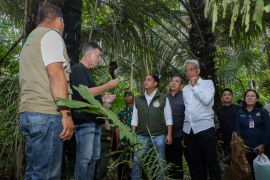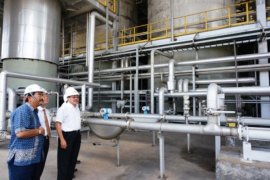The bio-ethanol plant is expected to give added value economically for local cassava growers, a local official said here Monday.
"As cassava as raw material for bio-ethanol production is no longer a problem, as in recent months, farmers who are members of farmer groups in the village have started to raise cassava," Head of Kapuas Transmigration office, Mariani noted.
She was optimistic that the bio-ethanol plant has good prospects of increasing the income of cassava growers in the future.
Mariani said the area of cassava plants that have been prepared covered five to six hectares which is managed by local farmer groups.
The bio-etahnol plant is ready to accommodate cassava imported for the village. However, the cassava purchased is only of a certain quality and a low price due to lack of operational funds of the factory.
If the cassava used as bio-ethanol raw material has a good quality which is purchased at good prices then it will cause the cost on bio-ethanol production to increase, Mariani explained.
She added, the office only performs oversight duties for the factory to operate optimally and perform construction management for the factory farmers .
The village had been selected as for bio-ethanol development because the soil is suitable for cassava cultivation.
Meanwhile, the head of Mangala Permai Dadahup G5 village, Lamijan said in normal circumstances it takes 3 tons of raw cassava to produce bio-ethanol.
The bio-ethanol plant is expected to provide economic added value for family or group and individuals who have land for bio-ethanol plant.(*)
Editor: Aditia Maruli Radja
Copyright © ANTARA 2011











